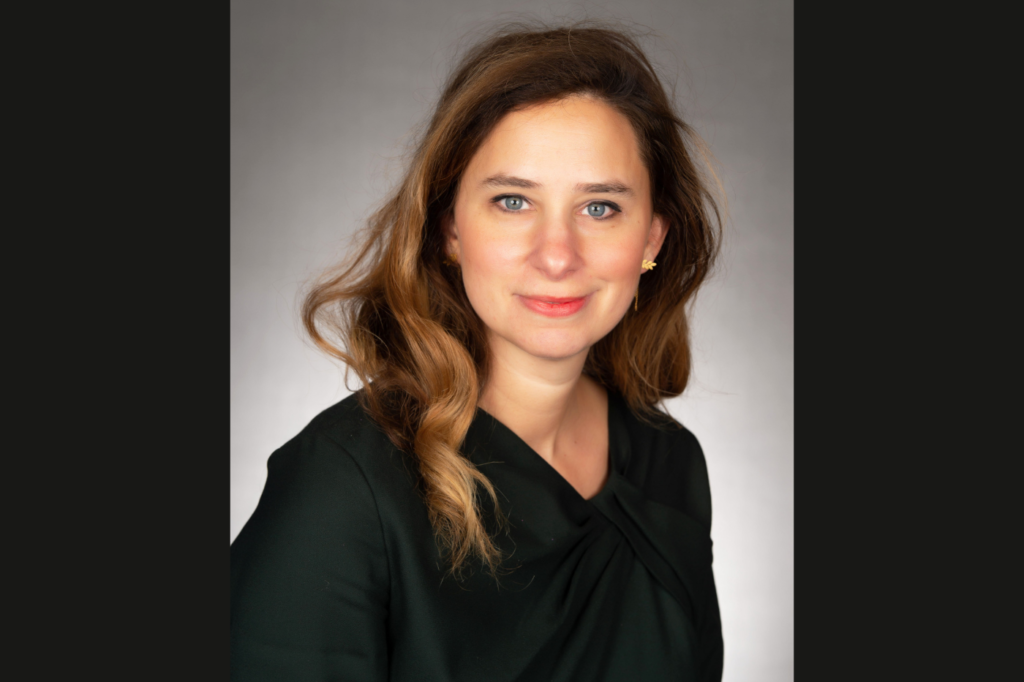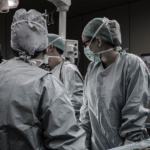Note from the Editors: Last weekend, Dr. Kristin Collier, an assistant professor of medicine at University of Michigan Medical School, delivered the keynote address for the school’s white coat ceremony—an event that marks the start of medical studies for the entering class. Members of the Gold Humanism Honor Society, which comprises students, residents, and faculty, voted to invite Dr. Collier to deliver remarks. Below is a lightly edited transcript of her speech.
Good afternoon. I’m quite honored to have been chosen as this year’s white coat ceremony speaker.
For a medical student, outside of graduation, I think this is the day in your professional life that means the most. It represents the line between the before and the after. This morning you walked in here as someone outside of the profession, and this afternoon you will walk out of here as someone on the inside. And that is what I want to talk with you about today. How to make it on the inside. And not just how to survive, but to thrive and flourish.
But before I do, I want to acknowledge the deep wounds our community has suffered over the past several weeks. It will take a lot of work for healing to occur, and I hope that today we can focus on what matters most: coming together to support our newly accepted students and their families and welcoming them into one of the greatest vocations that exists on this earth—the vocation of medicine.
Start your day with Public Discourse
Sign up and get our daily essays sent straight to your inbox.I was once like you—sitting in that seat in this very auditorium in 1997, that mixture of excitement and nerves, sort of wondering how I got here and how I was going to “do it.” Was I worthy of being here? Did I make the right decision? Why didn’t I go to business school?
I would like to share three pieces of advice that I hope will help you flourish. The first is: you are not a machine, and neither is your patient. The second is: ask big questions, and the third is: practice gratitude.
More than Machinery
You will soon realize that doctors speak in a language that is unique to the profession. One of the phrases you will often hear is “Oh, she is a MACHINE” to describe an unusually productive colleague. It’s meant to be laudatory—this person gets respect because she gets stuff done, often in a superhuman way, doesn’t need sleep, cranks it out, etc. While hard work and accomplishments are certainly respectable, I want to remind you that not only are you not a machine, neither should you strive to be one. By lapsing into this way of thinking, you strip away the very essence of what medicine is. You see, medicine is not merely a technical endeavor. Above all else, it is a human one.
In The Grapes of Wrath, John Steinbeck writes a story about a family of low resources during the Great Depression, who are driven from their home because of drought and economic hardship. It was a time of great technological and industrial advancement especially, for farming. Steinbeck reflects on the nature of man when he writes: “Carbon is not a man, nor salt nor water, nor calcium. He is all these, but he is much more, much more; and the land is so much more than its analysis. That man who is more than his chemistry . . . that man who is more than his elements knows the land that is more than its analysis. But the machine man, driving a dead tractor on land he does not know and love, understands only chemistry; and he is contemptuous of the land and of himself.”
Let’s read that last line again—the machine man, “understands only chemistry” and “he is contemptuous of the land and of himself.” What if I substituted the word “patient” for the word “land”? He becomes contemptuous of the patient and of himself.
I’m sure you’ve heard a lot about the crisis of physician burnout. This syndrome and its causes are complex, but the result of burnout is depersonalization. When you start seeing the patient in front of you, the one that you went into medicine for, as a non-person, you can become contemptuous of the patient. They become an impediment to getting home. And your feelings about yourself become disordered as well.
You will soon start learning a lot of biochemistry. A lot of pharmacology. A lot of histology. And that’s great. The science is beautiful and there is so much science to know. But the risk of this education, and one that I fell into, was that you can come out of medical school with a reductionist, mechanistic view of people and ultimately of yourself. You can easily end up seeing your patients as just a bag of blood and bones, or viewing life as mere molecules in motion.
I assume that most of you didn’t come into medicine to take care of a receptor, a symptom, an organ, or even a disease. These things are important, but they are inside human beings. Don’t take your eye off the ball! You are not technicians taking care of complex machines, but human beings taking care of other human beings. And human beings are fallible. You will soon learn all the ways in which human bodies are fallible, and this profession can test the limits of your bodies as well. Unlike a machine, you do need sleep, food, rest, relationships, and most of all love.
Medicine is an embodied profession in which two people come together in one of the most sacred relationships that there are. Get to know your patients as human beings—not just their scans, labs, chemistries, and data. The disease may not be unique, but every person is. Let’s resist a view of our patients and ourselves that strips us of our humanity and takes away from the very reason most of entered this profession in the first place: to take care of human beings in their moments of greatest need.
The risk of this education, and one that I fell into, was that you can come out of medical school with a reductionist, mechanistic view of people and ultimately of yourself. You can easily end up seeing your patients as just a bag of blood and bones, or viewing life as mere molecules in motion.
Ask Big Questions
Number two: ask big questions and lean in on the humanities to do so. Many of you have come from liberal arts colleges and universities and have studied big questions in fields like anthropology, sociology, philosophy, and literature. The big questions are more critical to ponder now than ever. And if you haven’t had a chance to ask big questions, now’s the time. Your answer to these questions has real impact on real lives. Questions like – what does it mean to be human? Why do human beings matter? Whom do we include in our moral sphere of concern? What is health? What is medicine and what is it for?
As we have discussed, biomedical education is heavy on science and technology. As it should be. But once you’re in practice, the scientific questions aren’t the hardest questions you face day-to-day in patient care. The great ancient philosopher Aristotle wrote about three types of knowledge. The first one is episteme, which is bare scientific knowledge, concerned with knowing what something is: the facts. The second type of knowledge is techne which is knowing how to do something, mechanically or procedurally. And the third type of knowledge is phronesis, which is a very different type of knowledge from the other two and what today we would call wisdom. Phronesis is practical wisdom: knowing the why of something and what good it aims at. Modern medicine is excellent at both episteme (knowledge of the what) and techne (knowledge of the how), but philosophical questions (questions of why) are largely absent in the practice of medicine.
The phronesis, or why, of medicine cannot be explored in a technical model. The word “philosophy” is literally translated, “the love of wisdom.” Medicine needs a philosophical lens to be able to see why medicine knows what it knows and does what it does. Without such a lens, medicine robs itself of a proper understanding of its goals, meaning, and purpose in its practice and reduces itself to a mechanistic production.
If you don’t develop a philosophy of medicine, so to speak, you risk getting burned out and trained by a hidden curriculum to be a mere technician.
Here’s an example of what asking a big question looks like. I give a lot of talks on bioethics, and I love asking my audience, “what is health?” People assume everyone has the same general idea of what health is, but often folks actually haven’t deeply pondered this question. The best answer I ever received on this question was from a medical student here. She told me the following: she was an anthropology major in Iowa as an undergrad. She had done qualitative research interviewing farmers and asked them what they thought health was. They often said: I don’t consider myself healthy unless the soil on my farm is healthy, the crops are healthy, the animals on my land are healthy, my neighbors are healthy.
It was a beautiful antidote to the impoverished answer I often get, which is “the absence of disease.” This student’s answer about the farmers speaks to a vision of health that extends beyond the individual and to communal flourishing that involves the entire created order and a picture of “shalom.” Your answers to these questions have real consequences. They will impact your view of the patient, what you think healthcare is or isn’t, what you might want to advocate, write about, or research. If you don’t develop a philosophy of medicine, so to speak, you risk getting burned out and trained by a hidden curriculum to be a mere technician. Traditional medical education often doesn’t teach health as shalom, but health as techne.
Gratitude and Limits
Number three: practice gratitude and acknowledge the limits of medicine. This profession, unlike many others, provides ample opportunity to become acquainted with grief. (Remember, you could have gone to business school.) But in becoming acquainted with grief, you will hopefully develop an appreciation for what truly matters and what does not.
Not infrequently at this hospital, cars are left behind in our parking garages by someone who walked into this place but never walked back out. No matter how long your day has been, or what you’ve had to do, or what you’ve had to miss to be here, for that moment in time, you aren’t the one in the sick bed.
When I was a third-year resident here, my chief resident Jake became ill, and he became the one in the sick bed. He had been interviewing for a competitive fellowship position in academic cardiology. He had been losing weight, looking tired, but we all knew he had been busy. He kept telling us that he had been busy. One night, shortly after arriving home from a flight, he arrived at our emergency department with shortness of breath. It was discovered that he had massively enlarged liver due to the presence of multiple, terrible masses. We were hoping that this was something easy. Or at least easier than what he ended up having. But what he had was bad and ended up taking his life.
It was over the course of the year that our institution watched our friend die. But we also saw him live. And it was painful. And what was even more shocking to us, at some level, was that we couldn’t save one of our own. Here we were, at one of the largest academic hospitals in the world, with all the technology and treatments at our disposal—the Chair of Medicine at the time was an oncologist, for God’s sake—yet Jake got sicker. We couldn’t cure him. He died. On our watch.
We lost our friend, and the world lost a great son, husband, brother, and doctor. Collectively, we lost the deeply held belief that medicine could be our savior. What had happened, in part, is that many of us had made medicine into what theologians call an idol. We had placed unrealistic expectations on medicine that it didn’t deserve and couldn’t live up to. When our idols come crashing down, pain ensues. But the right order of things shines out of that darkness. I have since grown to understand the limits of medicine, which have helped me grow into a better physician.
So how can we not be destroyed by the pain we see? How can witnessing suffering help us flourish on the “inside?”
I wish I could learned these painful truths in a different way. In an easier way. But I still talk about Jake and what he taught me about the limits of the vocation to which I have dedicated my life.
So how can we not be destroyed by the pain we see? How can witnessing suffering help us flourish on the “inside?” This profession tends to do one of two things: the suffering that comes with it can either harden you and make you into a burned-out machine, or you can allow the vocation to soften you. It can help you cultivate compassion, love, justice, and mercy. Let medicine do the latter of the two for you.
Medicine needs to come back to the humanities because they can help illuminate these truths most clearly. The mother of narrative medicine, Rita Charon, once wrote that training in the humanities lets one see the suffering. She says that is what the humanities are for. She writes: “What one gains by the sight of suffering is the knowledge of the cost of this life. For those who are prepared you receive a clear-eyed discernment of this thing, this life, its worth.”
In conclusion, in this work called medicine, we should give thanks to those who have come before us. The great philosopher Alasdair McIntyre once said that before you ask yourself, “what am I to do?” you must answer the question— “of what story am I a part?” You are now part of the story of medicine that is rich in both tragedy and joy. You have the potential to shape the future of medicine’s story if you resist the temptation to see yourself and others as machine, if you ask big questions, and if you practice gratitude along the way. Welcome to the profession of medicine, and Go Blue.














